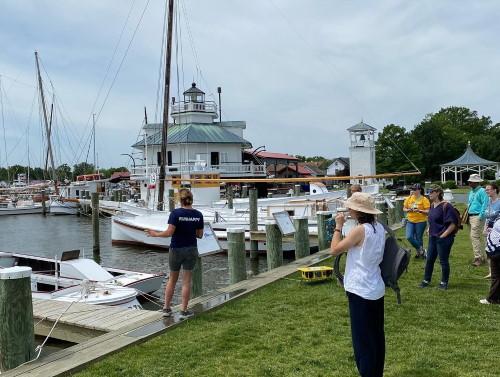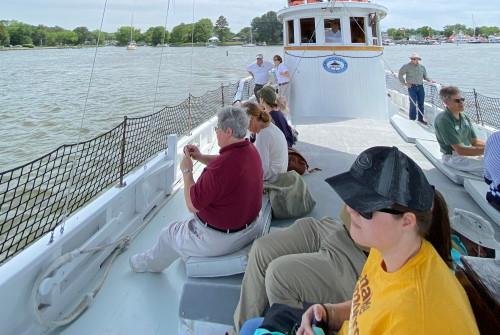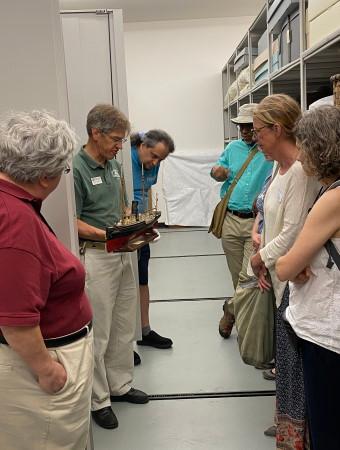
Chesapeake Studies
 Salisbury University is located on an amazing peninsula that has on its west side one of the United States’ great natural treasures, the Chesapeake Bay, the largest estuary in the U.S. and one of the largest in the world. The region provides rich resources for study, from the environment to culture and history, and SU takes full advantage of that, with numerous field trips, varied community engagement opportunities, laboratory and social science research, collections of archives and oral histories, and so on.
Salisbury University is located on an amazing peninsula that has on its west side one of the United States’ great natural treasures, the Chesapeake Bay, the largest estuary in the U.S. and one of the largest in the world. The region provides rich resources for study, from the environment to culture and history, and SU takes full advantage of that, with numerous field trips, varied community engagement opportunities, laboratory and social science research, collections of archives and oral histories, and so on.
Motivated by the belief that the Chesapeake and Delmarva deserve serious scholarly attention, not just at SU but more broadly, the SU Libraries has partnered with other units at SU – the Fulton School of Liberal Arts and the Henson School of Science and Technology – to promote what we are calling “Chesapeake studies.” While we dream of eventually having an interdisciplinary scholarly association, a journal and perhaps a minor in Chesapeake studies, we chose to start by holding conferences to promote the scholarly study of the region and stimulate the development of a network of Chesapeake studies scholars.
 In 2019, we held our first-ever conference, “Chesapeake Studies: Casting a Wide Net.” The participants enjoyed a mix of presentations and discussions on topics as wide-ranging as socio-ecological resilience to climate change, 19th-century boat building on the Eastern Shore, servitude and race in the broader Chesapeake, and transdisciplinary research approaches to the Chesapeake. The conference ended with optional field trips to the Horn Point Laboratory and Oyster Hatchery, the Harriet Tubman Underground Railroad Visitors Center, and Smith Island.
In 2019, we held our first-ever conference, “Chesapeake Studies: Casting a Wide Net.” The participants enjoyed a mix of presentations and discussions on topics as wide-ranging as socio-ecological resilience to climate change, 19th-century boat building on the Eastern Shore, servitude and race in the broader Chesapeake, and transdisciplinary research approaches to the Chesapeake. The conference ended with optional field trips to the Horn Point Laboratory and Oyster Hatchery, the Harriet Tubman Underground Railroad Visitors Center, and Smith Island.
Building on the excitement generated by the first conference, we planned a second in 2020. But COVID-19 hit. We then planned an in-person conference for 2021, because we think it is critical when trying to build up an interdisciplinary regional studies program for people to make the personal connections that are difficult to establish virtually. COVID-19 again forced its cancellation.
 Happily, in 2022, we did host our second conference, “Chesapeake Studies: Change and Continuity in America’s Estuary.” Participants seemed desperately grateful to be in person. This time, the presentations tilted more toward history and culture than the environment, with subjects such as Baltimore’s canning industry, Smith Island ethnography, Catholicism on the colonial Eastern Shore and musical traditions associated with Peter Dale Wimbrow, Delmarva’s songster. But the environment featured in several presentations, such as a discussion of flooding and public policy in Hampton Roads and stormwater management in the Nanticoke watershed. We once again ended the conference with field trips, visiting the Horn Point Laboratory and Oyster Hatchery again, as well as making a behind-the-scenes visit to the Chesapeake Bay Maritime Museum.
Happily, in 2022, we did host our second conference, “Chesapeake Studies: Change and Continuity in America’s Estuary.” Participants seemed desperately grateful to be in person. This time, the presentations tilted more toward history and culture than the environment, with subjects such as Baltimore’s canning industry, Smith Island ethnography, Catholicism on the colonial Eastern Shore and musical traditions associated with Peter Dale Wimbrow, Delmarva’s songster. But the environment featured in several presentations, such as a discussion of flooding and public policy in Hampton Roads and stormwater management in the Nanticoke watershed. We once again ended the conference with field trips, visiting the Horn Point Laboratory and Oyster Hatchery again, as well as making a behind-the-scenes visit to the Chesapeake Bay Maritime Museum.
We are now planning a third conference to be held in September 2023. The University of Maryland Center for Environmental Sciences has promised to participate, so we anticipate having a more even distribution of topics. And, we look forward to beginning discussions about how else to promote the study of the Chesapeake and Delmarva.